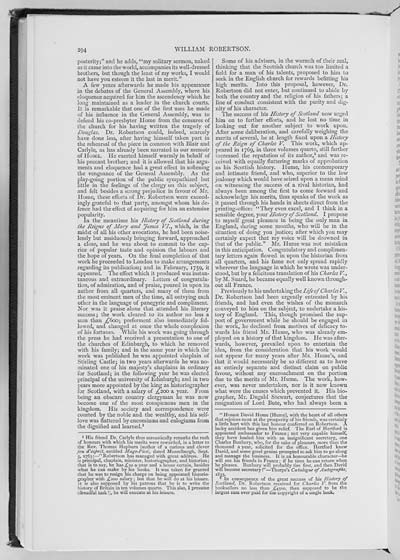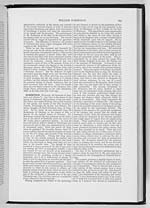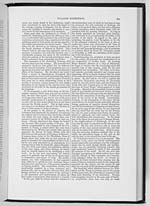294
posterity;" and he adds, "my solitary sermon, naked
as it came into the world, accompanies its well-dressed
brothers, but though the least of my works, I would
not have you esteem it the last in merit."
A few years afterwards he made his appearance
in the debates of the General Assembly, where his
eloquence acquired for him the ascendency which he
long maintained as a leader in the church courts.
It is remarkable that one of the first uses he made
of his influence in the General Assembly, was to
defend his co-presbyter Home from the censures of
the church for his having written the tragedy of
Douglas. Dr. Robertson could, indeed, scarcely
have done less, after having himself taken part in
the rehearsal of the piece in common with Blair and
Carlyle, as has already been narrated in our memoir
of HOME. He exerted himself warmly in behalf of
his peccant brother; and it is allowed that his argu-
ments and eloquence had a great effect in softening
the vengeance of the General Assembly. As the
play-going portion of the public sympathized but
little in the feelings of the clergy on this subject,
and felt besides a strong prejudice in favour of Mr.
Home, these efforts of Dr. Robertson were exceed-
ingly grateful to that party, amongst whom his de-
fence had the effect of acquiring for him an extensive
popularity.
In the meantime his History of Scotland during
the Reigns of Mary and James VI., which, in the
midst of all his other avocations, he had been noise-
lessly but assiduously bringing forward, approached
a close, and he was about to commit to the cap-
rice of popular taste and opinion the labours and
the hope of years. On the final completion of that
work he proceeded to London to make arrangements
regarding its publication; and in February, 1759, it
appeared. The effect which it produced was instan-
taneous and extraordinary. Letters of congratula-
tion, of admiration, and of praise, poured in upon its
author from all quarters, and many of them from
the most eminent men of the time, all outvying each
other in the language of panegyric and compliment.
Nor was it praise alone that attended his literary
success; the work cleared to its author no less a
sum than �600; preferment also immediately fol-
lowed, and changed at once the whole complexion
of his fortunes. While his work was going through
the press he had received a presentation to one of
the churches of Edinburgh, to which he removed
with his family; and in the same year in which the
work was published he was appointed chaplain of
Stirling Castle; in two years afterwards he was no-
minated one of his majesty's chaplains in ordinary
for Scotland; in the following year he was elected
principal of the university of Edinburgh; and in two
years more appointed by the king as historiographer
for Scotland, with a salary of �200 a year. From
being an obscure country clergyman he was now
become one of the most conspicuous men in the
kingdom. His society and correspondence were
courted by the noble and the wealthy, and his self-
love was flattered by encomiums and eulogiums from
the dignified and learned.1
1 His friend Dr. Carlyle thus sarcastically remarks the rush
of honours with which his merits were rewarded, in a letter to
the Rev. Thomas Hepburn (author of a curious and clever
jeu d'esprit, entitled Mago-Pico), dated Musselburgh, Sept.
5, 1763:�"Robertson has managed with great address. He
is principal, chaplain, minister, historiographer, and historian;
that is to say, he has �50 a-year and a house certain, besides
what he can make by his books. It was taken for granted
that he was to resign his charge on being appointed historio-
grapher with �200 salary; but that he will do at his leisure,
it is also supposed by his patrons that he is to write the
history of Britain in ten volumes quarto. This also, I presume
(dreadful task!), he will execute at his leisure.
Some of his advisers, in the warmth of their zeal,
thinking that the Scottish church was too limited a
field for a man of his talents, proposed to him to
seek in the English church for rewards befitting his
high merits. Into this proposal, however, Dr.
Robertson did not enter, but continued to abide by
both the country and the religion of his fathers; a
line of conduct consistent with the purity and dig-
nity of his character.
The success of his History of Scotland now urged
him on to further efforts, and he lost no time in
looking out for another subject to work upon.
After some deliberation, and carefully weighing the
merits of several, he at length fixed upon a History
of the Reign of Charles V. This work, which ap-
peared in 1769, in three volumes quarto, still further
increased the reputation of its author,2 and was re-
ceived with equally flattering marks of approbation
as his Scottish history. Hume, his contemporary
and intimate friend, and who, superior to the low
jealousy which would have seized upon a mean mind
on witnessing the success of a rival historian, had
always been among the first to come forward and
acknowledge his merits, thus speaks of the work as
it passed through his hands in sheets direct from the
printing-office: "They even excel, and I think in a
sensible degree, your History of Scotland. I propose
to myself great pleasure in being the only man in
England, during some months, who will be in the
situation of doing you justice; after which you may
certainly expect that my voice will be drowned in
that of the public." Mr. Hume was not mistaken
in this anticipation. Congratulatory and complimen-
tary letters again flowed in upon the historian from
all quarters, and his fame not only spread rapidly
wherever the language in which he wrote was under-
stood, but by a felicitous translation of his Charles V.,
by M. Suard, he became equally well known through-
out all France.
Previously to his undertaking the Life of Charles V.,
Dr. Robertson had been urgently entreated by his
friends, and had even the wishes of the monarch
conveyed to him on the subject, to undertake a his-
tory of England. This, though promised the sup-
port of government while he should be engaged in
the work, he declined from motives of delicacy to-
wards his friend Mr. Hume, who was already em-
ployed on a history of that kingdom. He was after-
wards, however, prevailed upon to entertain the
idea, from the consideration that his work would
not appear for many years after Mr. Hume's, and
that it would necessarily be so different as to have
an entirely separate and distinct claim on public
favour, without any encroachment on the portion
due to the merits of Mr. Hume. The work, how-
ever, was never undertaken, nor is it now known
what were the causes which prevented it. His bio-
grapher, Mr. Dugald Stewart, conjectures that the
resignation of Lord Bute, who had always been a
" Honest David Home [Hume], with the heart of all others
that rejoices most at the prosperity of his friends, was certainly
a little hurt with this last honour conferred on Robertson. A
lucky accident has given him relief. The Earl of Hertford is
appointed ambassador to France; not very capable himself,
they have loaded him with an insignificant secretary, one
Charles Bunbury, who, for the sake of pleasure, more than the
thousand a year, solicited for the office. Hertford knew
David, and some good genius prompted to ask him to go along
and manage the business. It is an honourable character�he
will see his friends in France; if he tires he can return when
he pleases. Bunbury will probably tire first, and then David
will become secretary !"�Thorpe's Catalogue of Autographs,
1833.
2 In consequence of the great success of his History of
Scotland, Dr. Robertson received for Charles V. from the
booksellers no less than �4500, then supposed to be the
largest sum ever paid for the copyright of a single book.

![]() Universal Viewer |
Universal Viewer | ![]() Mirador |
Large image | Transcription
Mirador |
Large image | Transcription
![]()

